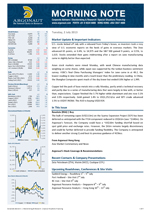Market Update & Important Indicators
U.S. stocks rose modestly, snapping a four-session losing streak. The Dow was up 34 points, or 0.2%, to 17,713 on Friday. Despite the gains, stocks posted their biggest weekly losses since late January, with the Dow and S&P slipping 2.3% and 2.2%, respectively, for the week. The declines push the Dow about 3.1% off its high reached earlier this month, and the S&P 500 is 2.7% off its intraday record hit in late February. The dollar eased against the euro and the British pound as lukewarm U.S. data reflected a mildly slowing economy and diminishing confidence among Americans to spend money. Numbers for the final revision of the U.S. gross domestic product for the last three months of 2014 came in below forecasts, reviving investors' caution about when the Fed might raise rates.
European stocks edged higher Friday, reversing a two-session selloff. The Stoxx Europe 600 index ended the session 0.3% higher while Germany's DAX and France's CAC both rose 0.2% and 0.6% respectively. London's FTSE 100 was the notable underperformer of the region, weighed in part by a slide in mining stocks on news that Chile's copper mining industry has been hit by torrential rain that has forced the shutdown of some of the world's largest mines.
Asian markets ended mixed Friday as concerns about the U.S. economy and uncertainty ahead of expected comments from Federal Reserve Chairwoman Janet Yellen inhibited movement in some markets, while others saw profit-taking. Japan's Nikkei Stock Average ended down 1.0% at 19286 in a rare session that saw both stock and government bond futures undergo brisk selling. Hong Kong's Hang Seng Index ended fractionally lower at 24,486.
Base metals were mainly lower on the LME, with copper declining 1.9%. Brent crude oil fell sharply, off 4.7% to $56.41/bbl. Gold also dropped, falling 0.5% to $1,198/oz.
Thought for the day
WA Industrials – Sector winners & losers
WA is home to more than ninety listed industrial companies capped over $25m. While nearly a quarter of these provide products and services to the resources sector, there is a wide spread of other sectors represented.
2015 performance
The Telecomms sector has led the pack in performance so far this calendar year, led largely by the performance of Ziptel (ZIP), which has nearly doubled off a low base. IT companies have also had a good start to 2015, with strong performance from the likes of 1-Page (1PG) and ASG Group (ASZ).
Not surprisingly, resource services companies continue to languish in one of the toughest operating environments this sector has seen in more than a decade. Despite large share price falls leading up to 2015, more than 50% of these companies have lost at least a further 10% in less than three months year to date. While Health and Pharmaceutical companies have also fared badly this year, this follows a couple of years of really strong growth.
Longer term performance
Comparing share price performances going back to December 2011 provides an indication of sector gains and losses over a longer period (just over 3 years). Telecomms is again in front over this time frame, with WA stalwarts Amcom (AMM) and iiNet (IIN), both of whom have recently attracted suitors, up more than 200%.
The Health and Pharmaceuticals sector has also shown strong gains of over 100%, with OBJ Limited (OBJ) the standout performer. OBJ has climbed more than 300% over this period as it moves its technology towards commercialisation. The IT is another strong sector performer, with Structural Monitoring Systems (SMS) and Empired (EPD) amongst the winners.
Resource related industrials have had it tough over the three and a bit years, with a number of these companies’ share prices having fallen more than 75% over the period. Ausdrill (ASL), Emeco (EHL), Lycopodium (LYL), Macmahon (MAH), MMA Offshore (MRM), NRW Holdings (NWH) and VDM group (VMG) all fall into this category, and there are a number of others that are not far behind.
Volatility
As would be expected, some sectors tend to show less volatility than others. Sectors like Consumer Discretionary may not have shot the lights out, but it has been a consistent performer over time, while others, like Health and Pharma show far more volatility.
Winners & Losers
Over the last 3 or so years, the star performers have typically been those companies involved in IT, Technology and Telecomms, while those that have languished have borne the brunt of the resource sector slowdown.
What does it all mean?
From a portfolio perspective as far as WA stocks are concerned, owning shares in sectors that have less volatility (such as the Consumer Discretionary, Consumer Staples, Telecomms and Utilities sectors) will give you reasonable returns and also help you sleep at night, but owning stocks in more volatile sectors (such as Health & Pharma, Resource Services and IT) will give you a wilder, but potentially far more rewarding, ride. But you knew that already – investing is all about risk and return (and sometimes a dash of luck!).
In This Issue
Metals & Mining | No hiking with royalties
A report (“Mineral Royalty Rate Analysis”), completed by the WA Department of State Development and Department of Mines and Petroleum, proposed 18 recommendations regarding mineral royalties in the state. A key recommendation is the increase in gold royalty from 2.5% to 3.75%. The adoption of the recommendation will see an additional ~A$120m per annum transferred from gold companies to the State. The WA mines minister had declared no change to the state budget this year, and it is possible that adoption of the proposals will not occur before the next election in March 2017. Given Argonaut’s deferred assumption, modest Reserve bases and relatively robust AUD margins, the potential impacts appear limited on Argonaut’s coverage list. However, the increased royalty rate, if adopted, will likely come from exploration budgets, particularly for junior miners, adversely affecting long term prospects of the WA gold industry. No material valuation impact is expected for iron ore or base metal miners.
Recent Contacts & Presentations
Saracen (SAR), Beadell (BDR), Pacifico (PMY), Fertoz (FTZ), Atrum (ATU), Doray (DRM), Helix Resources (HLX), Rift Valley Resources (RVY), West African Resources (WAF), Matrix (MCE), Austal (ASB), Ausdrill (ASL), TFS Corporation (TFC), Gage Roads (GRB), Austin Engineering (ANG), Buru Energy (BRU), OBJ Limited (OBJ), Strandline Resources (STA), Carnarvon Energy (CVN), Otto Energy (OEL), Empire Oil & Gas (EGO), Pura Vida Energy NL (PVD), MMA Offshore (MRM), Migme (MIG), Vmoto (VMT)
Please read Argonaut's Important Disclaimers & disclosures
Log in to the client area below to download the full Morning Note PDF


